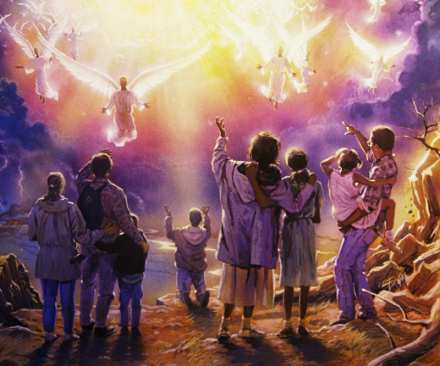The Day of the Lord, Postponed Indefinitely

If you read through the Bible, you'll notice a constant theme of people predicting the end of the world as we know it, or at least a huge supernatural event. In the parts of Isaiah that probably weren't actually written by Isaiah, the author predicts the total destruction of Babylon and Edom, and the exaltation of the Jews. While the Jews were allowed to return to Judea and reinstate the full practice of their religion after the Persians conquered Babylon, the city wasn't destroyed. It was maintained by the Persians as a regional capital, and it remained a significant cultural center until the battles between Alexander the Great's successors resulted in its decline. As for Edom, it remained until the time of the Jewish Wars in the early AD years, and the area is still inhabited. I believe most of it is now part of the Kingdom of Jordan. And while the Jews were restored and granted considerably more freedom than they had been by the Assyrians or Babylonians, they remained part of a larger empire, and I haven't heard of Judaism really spreading much in those days.

While purported to take place in the time of the Babylonian captivity, scholars now regard the Book of Daniel as having been written in the time of the Greek occupation, and to deal with that time period. In several dreams involving beasts and angels, Daniel learns that the Archangel Michael will eventually overthrow the Greeks, and that "one like a son of man" will rule over the entire world. Also, the resurrection of the dead will happen around the same time. Parts of the once-popular apocryphal Book of Enoch were also believed to have been written around this time, and they deal more directly with the "one like a son of man," identifying this figure as Enoch himself having returned to Earth. Once again, the Jews did eventually achieve victory over the Greeks, and I'm sure the common belief among the faithful was that God had helped them in their struggle. While I personally find it unnecessary to credit anything that can be explained in a natural manner to a supernatural power, others might well see this as the very point of religion. Even if God doesn't directly intervene in human affairs, the stories told about Him can inspire people to do great things on their own. I'm meeting you halfway, theists! {g}
The New Testament has its own apocalyptic book in Revelation, and we see the same themes at work again. This time the foreign power to be overthrown is Rome, although John of Patmos refers to it in code as "Babylon." Indeed, there's a lot of material there borrowed from Old Testament apocalyptic prophecies. The beasts of Daniel are back in slightly modified forms, Michael is fighting for the faithful again, and the Son of Man shows up. Only this time, since the work is Christian (albeit dating to a time when Christians still considered themselves to be Jews), he's specifically said to be Jesus on his triumphal return to Earth. And in this case, the book was pretty far off from what actually happened. A Jewish revolt was put down by the Romans, and the Jews scattered throughout the world. Christianity continued to develop, but in a form with less direct Jewish influence. The Roman Empire thrived for some time, and eventually Christianity became its official religion. I don't think John would have seen that twist coming. Some took this as a sign that the millennial kingdom had already arrived (despite the fact that things still weren't all that great, and indeed European civilization entered a period of gradual decline), while many centuries later the Protestants would regard the Catholic Church as the new Roman Empire to be overthrown by Jesus.

As we can see, pretty much every major struggle in the Bible is thought to be a sign of the coming of the Messianic Age, and every time the prophets have been wrong. As usual, though, this doesn't bother the faithful, who just insist that the prophecies are actually dealing with something else that hasn't happened yet. The predictions about the Greeks were reinterpreted during the Roman era, and I hear plenty of people today holding to an end times scenario that's made up of components of Revelation, Daniel, and several other sources. Most of it, however, isn't really in the Bible at all. Someone came up with the Rapture and the Antichrist as possible interpretations of certain passages, and now it's hard to find a Christian apocalyptic scenario that doesn't include them, despite there being no specific references to them in the scriptures. And these prophecies always relate to things that are happening today. I can't help but think that John of Patmos would have been pissed off if he'd known that the stuff he was writing about wouldn't actually come true for another 2000 years. But anyway, apparently the people of all these earlier eras were wrong about WHEN the great Day of the Lord would occur, but they were correct in thinking it would happen. I can't predict the future, but I can't help finding a pattern here, and thinking that today's apocalypse-mongers aren't bothering to take into account that people have been predicting the end of the world for ages now, and it's never happened. And if it ever does, it will probably be due to an explainable phenomenon (if nothing else, then the Sun becoming a red giant in another few billion years, although I doubt humanity will still be around then), not to the Messiah and the angels arriving to do some supernatural damage.
